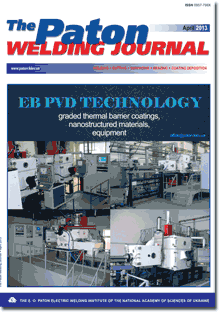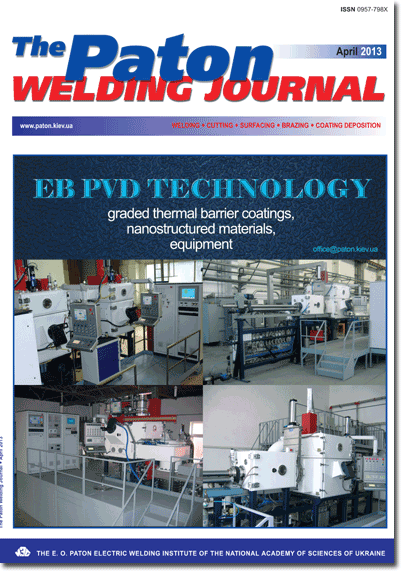| 2013 №04 (01) | 2013 №04 (03) |

The Paton Welding Journal, 2013, #4, 8-14 pages
WELDABILITY OF SPARSELY-ALLOYED STEELS 06GBD AND 06G2B
V.D. POZNYAKOV, S.L. ZHDANOV, A.A. MAKSIMENKO, A.G. SINEOK and A.M. GERASIMENKO
E.O. Paton Electric Welding Institute, NASU, Kiev, Ukraine
Abstract
The aim of this work was the investigation of weldability of sparsely-alloyed niobium-containing steels 06GBD and 06G2B with the yield strength of more than 390 MPa, and also evaluation of properties of their welded joints at different technological welding processes as-applied to manufacture of unique building structures (bridges, tanks of 50,000—70,000 m3 capacity, blast furnaces). Basing on the analysis of thermokinetic diagram obtained using rapid-response dilatometer and results of tests of model thermocycled specimens the correlation at the cooling rates w6/5 in the range of 1.3—70 °C/s between structure of metal of heat-affected zone of welded joints and their properties was established. Considering the results of tests on delayed fracture of welded joints, the range of admitted energy inputs of welding was established providing their high cold resistance and resistance to cold crack formation. The offered welding conditions and welding consumables found their application in manufacture of steels 06GBD and 06G2B welded structures of oil tanks of large capacity and bridges. 8 Ref., 5 Tables, 8 Figures.
Keywords: sparsely-alloyed steel, weldability, thermokinetic diagram, cooling rate, structure, simulated metal of heat-affected zone, cold cracks, technological sample
Received: 07.02.13
Published: 28.04.13
References
1. Mikhoduj, L.I., Kirian, V.I., Poznyakov, V.D. et al. (2003) Sparsely-alloyed high-strength steels for welded structures. The Paton Welding J., 5, 34—37.
2. Grabin, V.F., Golovko, V.V., Kostin, V.A. (2004) Morphological peculiarities of microstructure of weld metal from low-alloy steels with ultralow content of carbon. Ibid., 7, 15—20.
3. Goldshtejn, M.I., Gladshtejn, L.I., Golovanenko, S.A. (1977) Carbonitride strengthening of low-alloy steels. Stal, 9, 833—837.
4. Poznyakov, V.D., Barvinko, A.Yu., Barvinko, Yu.P. et al. (2012) Cold resistance and lamellar fracture resistance of welded joints on steel 06GB-390. The Paton Welding J., 3, 35—39.
5. Ivashchenko, G.A., Demchenko, Yu.V. (1990) Principles of choice of chemical composition of higher strength and cold resistance steels for welded structures. In: Advanced methods for producing of structural steel and cast iron welded joints. Kiev: PWI, 110—116.
6. Pilyushenko, V.L. (1987) Influence of microalloying on service characteristics of steels. Stal, 10, 24—26.
7. Grigorenko, G.M., Kostin, V.A., Orlovsky, V.Yu. (2008) Current capabilities of simulation of austenite transformations in low-alloyed steel welds. The Paton Welding J., 3, 22—24.
8. Sarzhevsky, V.A., Sazonov, V.Ya. (1981) Unit for simulation of welding thermal cycles on the base of MSR-75 machine. Avtomatich. Svarka, 5, 69—70.
Suggested Citation
V.D. POZNYAKOV, S.L. ZHDANOV, A.A. MAKSIMENKO, A.G. SINEOK and A.M. GERASIMENKO (2013) WELDABILITY OF SPARSELY-ALLOYED STEELS 06GBD AND 06G2B. The Paton Welding J., 04, 8-14.The cost of subscription/purchase order journals or individual articles
| Journal/Currency | Annual Set | 1 issue printed |
1 issue |
one article |
| TPWJ/USD | 384 $ | 32 $ | 26 $ | 13 $ |
| TPWJ/EUR | 348 € | 29 € | 24 € | 12 € |
| TPWJ/UAH | 7200 UAH | 600 UAH | 600 UAH | 280 UAH |
| AS/UAH | 1800 UAH | 300 UAH | 300 UAH | 150 UAH |
| AS/USD | 192 $ | 32 $ | 26 $ | 13 $ |
| AS/EUR | 180 € | 30 € | 25 € | 12 € |
| SEM/UAH | 1200 UAH | 300 UAH | 300 UAH | 150 UAH |
| SEM/USD | 128 $ | 32 $ | 26 $ | 13 $ |
| SEM/EUR | 120 € | 30 € | 25 € | 12 € |
| TDNK/UAH | 1200 UAH | 300 UAH | 300 UAH | 150 UAH |
| TDNK/USD | 128 $ | 32 $ | 26 $ | 13 $ |
| TDNK/EUR | 120 € | 30 € | 25 € | 15 € |
AS = «Automatic Welding» - 6 issues per year;
TPWJ = «PATON WELDING JOURNAL» - 12 issues per year;
SEM = «Electrometallurgy Today» - 4 issues per year;
TDNK = «Technical Diagnostics and Non-Destructive Testing» - 4 issues per year.


